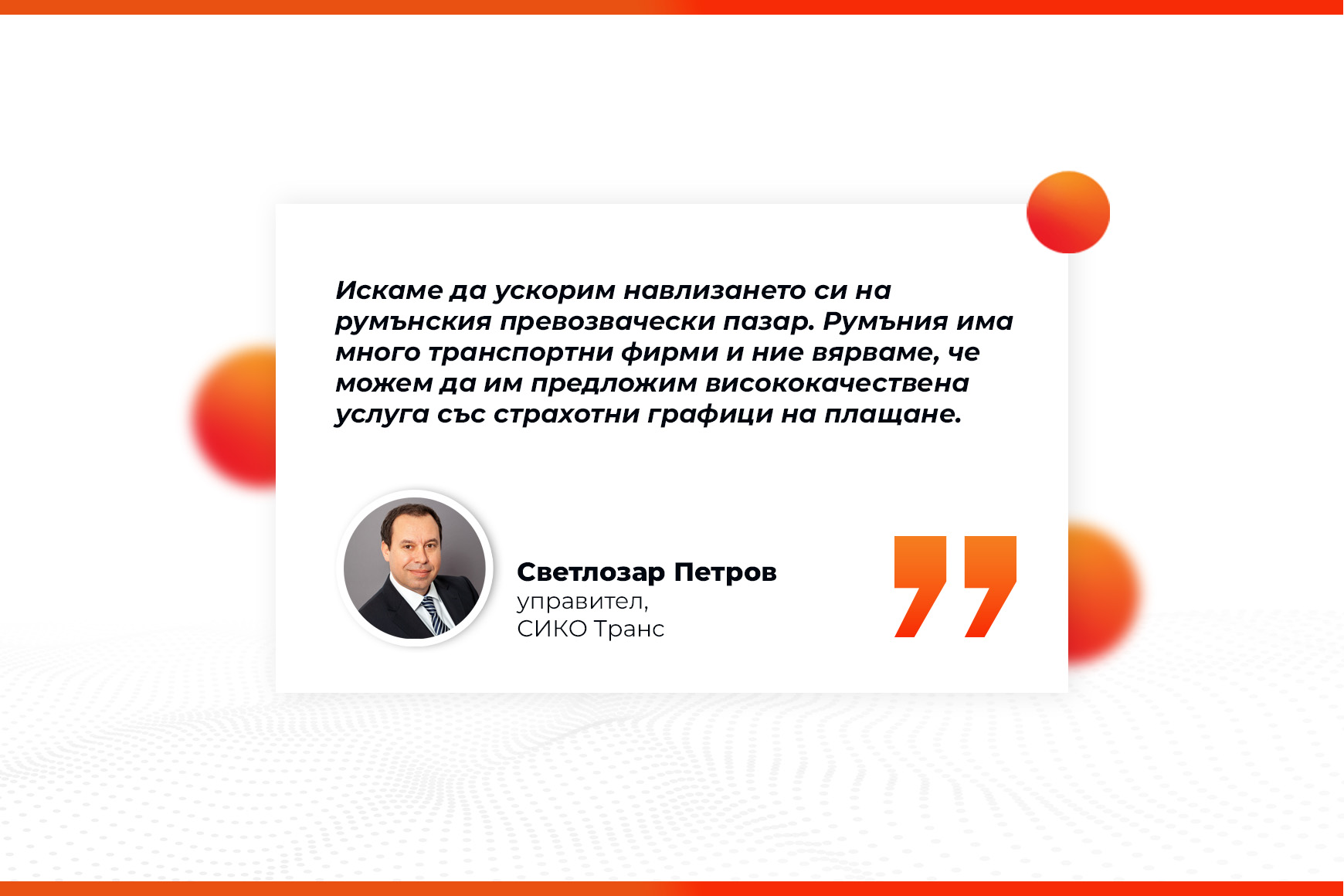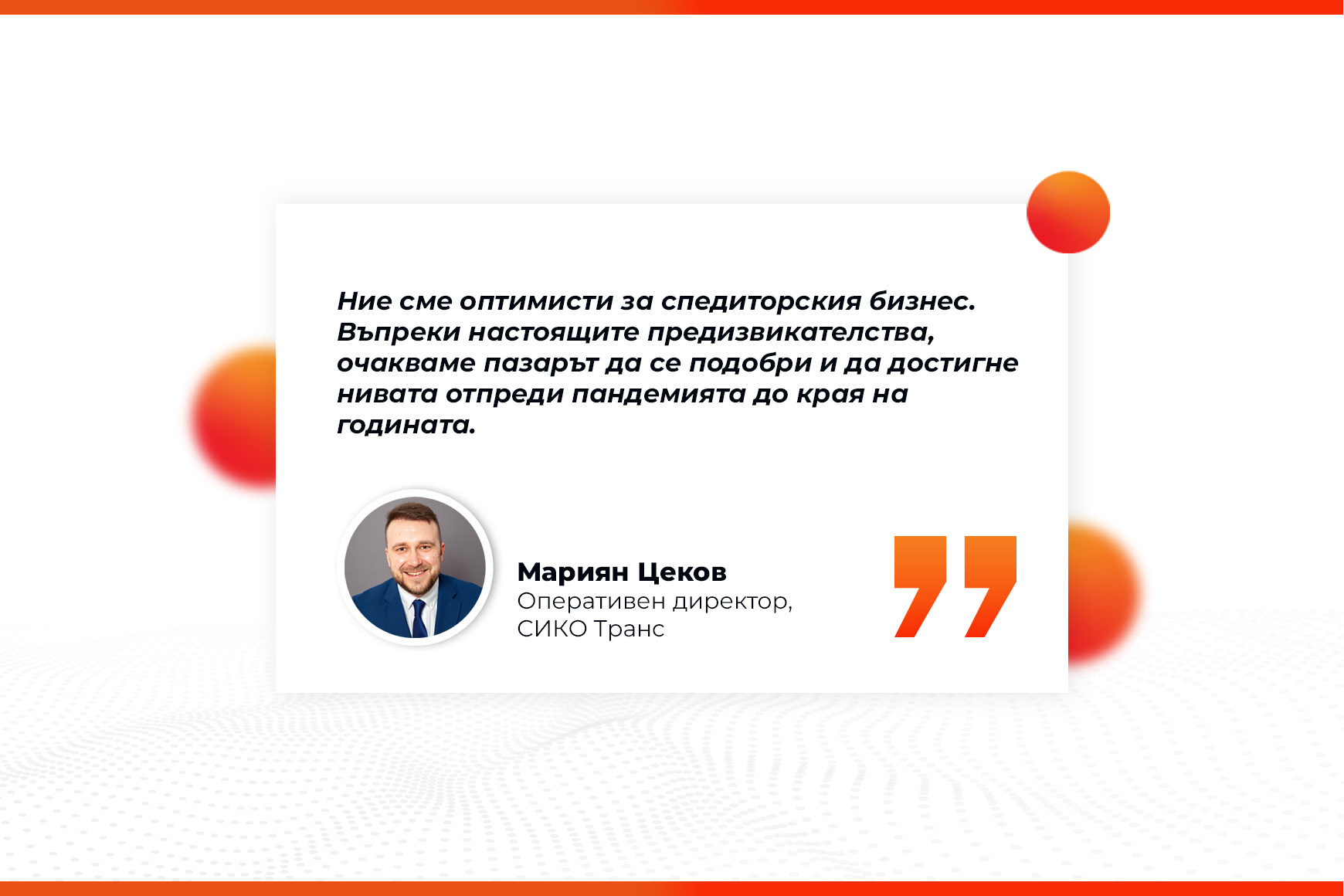

On the occasion of our partnership with Trans.euand the creation of the first Private exchange of ELBOW, with colleagues from the international cargo platform we conducted an interview, which today we share on our website.
See what our colleagues Svetlozar Petrov, Managing Director, and Mariyan Tsekov, COO, answered Elena Konstantinescu's questions from Trans.eu.
The original text of the interview can be read at Trans.eu blog.
How would you describe SIKO in a few words? Share a little more about the company.
S.P.: We started as a transport company before more than 20 years. We gradually developed and a few years later we entered the field of forwarding. Sometime around 2012, we switched entirely to shipping.
What we provide for our customers and partners is better service, better communication, more responsibility. This is our main advantage. As a freight forwarding company, we have increased the opportunities to offer transportation that covers multiple needs and routes, compared to when we started and simply ran our own fleet of trucks. We operate strictly according to the guidelines of ISO 9001. Acquiring the certificate was an eye-opening process because it made us aware of all the potential risks in our activity. Thus, our control over the transportation process is better. We are safer, and so are our customers.
Another thing that is in SIKO's DNA is that we have always worked for the entire business sector to be a better place, with better relationships, even with our competitors, with all contractors and partners, as well as internally within the company.
SIKO is the guarantor of a good place to work, with great relationships between colleagues. Our corporate culture is important to us, as is cultivating a sense of community where we can share and grow together, including through CSR Initiatives.
How did your career in logistics begin?
S.P.: We created the company with my partner Kolyo Doynov. He was very keen on trucks, and I personally had experience from the Technical University, where I studied Transport. In addition, I had gained some experience in a large international shipping company. And that's where the idea came from, it was inspiring to see how big business works. That's how we founded the company, and as the business grew, our team of colleagues grew.
What are the key events in recent years that have had the greatest impact on the sector and on SIKO as a company?
S.P.: COVID restrictions, of course. The lack of transport options and the slowing economy have made the outlook very different. We have adapted, looking for software solutions. We try to optimize the processes so that we can make the work easier and more predictable.

What are the biggest needs you would like technology to meet in your business and sector?
S.P.: We use different solutions for different needs and try to digitize as much as possible. Perhaps the biggest breakthrough would be for this digital transformation to happen across the industry. As a market, Bulgaria still has a lot to catch up on in this area.
But we try to be innovative and lead the rest of the group as well. We do this by implementing technology solutions in different parts of the business. And this is the most important thing for me: I would like to see more and more carriers and customers use software to make their operations more reliable and predictable. In order to facilitate planning as well. Planning is one of the main issues in our industry. Everyone wants their goods to be loaded or unloaded on time, but this requires increasingly better processes and communication. So automation in this area is and will be key.
What are the main benefits you expect from digitization, other than ensuring that everything arrives on time?
S.P.: The best solution should lead to better communication and visibility throughout the ecosystem. I'll give you an example. If we can implement the carrier GPS tracking system in our system and have this information reach our customers conveniently, it will make the process shorter and more reliable. If the customer can see where the truck is, we would save ourselves a lot of emails, chats and phone calls. Everything would become not only faster, but also more reliable.
Speaking of the implementation of IT solutions, what are the biggest difficulties in a new project?
S.P.: The biggest challenge is the distrust on the part of the carrier — both towards the customers and towards us. This distrust results in them not sharing accurate information about the truck and the driver. Sometimes they get stuck in the old ways of doing business, with the mentality of “believe me, it will happen.” Increased predictability would ensure better outcomes for everyone.
Perhaps this is a cultural feature and is related to the way of thinking. Most of the time, with Western carriers, the process is very easy. They share GPS coordinates, easily share any information and provide it in a user-friendly format. And for us, sharing information with customers is important to give them the opportunity to better plan their processes.
What are the key IT projects you have implemented in recent years? Tell a series of benefits and lessons learned from them.
S.P.: We have created our own application,SIKO App. All carriers that work with us can create an account, see the invoices that are waiting with us and the exact payment due date. They can plan their finances and take advantage of the “Quick Pay” option. It's all automated.
So carriers can easily plan their finances, and if they want to get paid faster, they can apply for it with just a few clicks.
On a slightly more corporate level, We digitized our entire HRarchiving and management of labor records, which system is already working since June 1. All applications for leave or sick leave or other types of documents are submitted and processed digitally. Our colleagues can monitor or request similar information also with a few clicks. We hope this step will help us and optimize our communication with the NRA.
How important is integration between systems for business?
S.P.: Integration is very important and we expect it to accelerate in the future. All our customers and partners should be ready for such integrations. A human attitude is key to business and it can open doors. But in the background, there must be some integration of business management systems.
For example, integration with the operator tracking system will bring a better quality of service to us and customers. It's very important.
In addition, if we communicate on a safe, certified platform, such as Trans.eu, it will be easier, from a security point of view. Digital markets such as Trans.euhave strict rules about who has access to the platform and how users can identify themselves, which brings additional reliability. For example, while it's easy to exchange documents via email, there's no guarantee whose identity is behind an account, which can be a significant threat to any company. I believe that platforms such as Trans.eucan improve the security of the transportation industry, providing a more secure environment for business operations.

Why did you choose the Private Exchange project with Trans.eu?
S.P.: The first and most important reason is security, as I just mentioned. We can use the platform to communicate with trusted operators that we know. In addition Trans.euhas already proven itself as a transport platform. We can easily check the profile of a company. We can also check the reviews submitted by their customers. And at the same time, be confident that we are handling credible information
What is the most important thing about your cooperation with carriers?
S.P.: Easy communication is the most important thing. Fast and clear. How do they communicate if a problem arises? Are they hiding or are they open and trusting so that we can solve the problem together? Communication is the number one factor in transportation.
What are the most important automations for SIKO? What are the things you still want to automate?
S.P.: Automation is needed for trucks and the location of cargoes. The presence of ETA (time of arrival) is enough for everyday communication. So that our customers know where their goods are and how they are moving and that we do not have to spend time calling, sending emails or chats for such simple things.
What are the masters of SIKO for the next few years and what do you want to achieve as a company?
S.P.: Firstly, we want to accelerate our entry into the Romanian transport market. Romania has many transport companies and we believe that we can offer them a good service, with good and favorable conditions. I believe that we can also support them to overcome these difficult economic times and grow together.
So this is short term. In the long term, digitalization is the first step towards automation. Automated trucks, air cargo and courier shipments as drone deliveries in major cities. We are open to innovative solutions and seek every opportunity for growth through automation.
What do you expect from the partnership with Trans.eu?
S.P.: We will start using the Private Exchange and would like to apply it to more forwarders. So in the next few months, the goal is to have more users on the platform for ELBOW. And as I said, we really hope that we can reach the Romanian carriers through the platform Trans.eu.
To conclude our conversation, I want to ask you what are your expectations for the industry? What are the key things you expect to happen in the coming months? How do you see the development of the market? Are you optimistic?
M.C.: I am optimistic about the freight forwarding business. I see that the market is moving and getting better. Prices are rising, which gives us more opportunities for new projects. We understand that probably the summer will still be difficult, but we believe that from September to October the market will be at the same level as two years ago.
Follow us on Facebook.
Your career with us awaits you in LinkedIn.
And if you are among our reliable carriers, use the mobile application SIKO App.